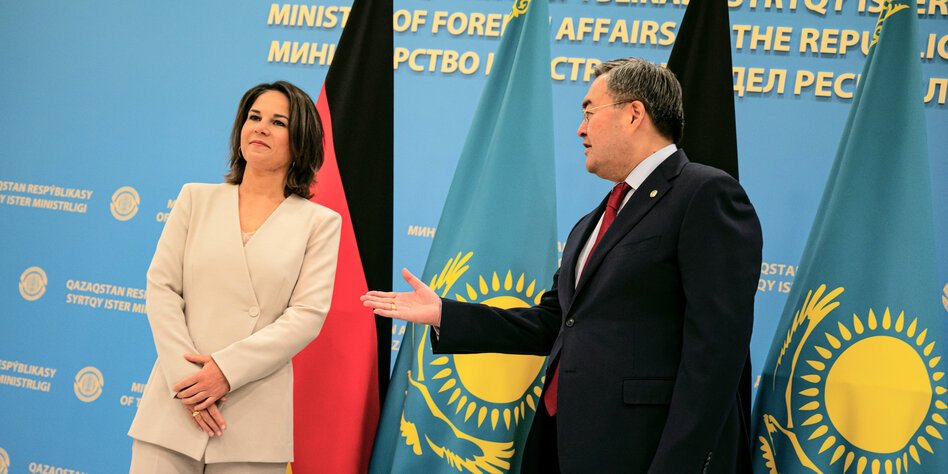Post Views: 629
Against the backdrop of Russia’s war in Ukraine, German Foreign Minister Annalena Berbock is visiting the countries of Central Asia and offering them increased cooperation with Europe.The German media pay much attention to the visit of German Foreign Minister Annalena Baerbock
to Kazakhstan and Uzbekistan . “In search of new partners” – this is how ZDF TV company characterizes the main purpose of the trip. Many publications cite a statement made by the head of German diplomacy before flying to two key countries of Central Asia: “It is important to me that the future provides them with a choice not only between a tight straitjacket in the backyard of Russia and dependence on China.”
Kazakhstan is Germany’s most important trading partner in the region
“After Putin’s invasion of Ukraine, many Central Asian states are
cautiously distancing themselves from Russia . China can take advantage of this, but Europe also sees its chance,” notes the Frankfurter Allgemeine Zeitung. The newspaper recalls that last week the head of the European Council (“EU President”) Charles Michel visited Astana and, after negotiations with Kazakh President Kassym-Jomart Tokayev, emphasized that Europe and Central Asia are now drawing closer and connected with each other like never before.“Since the beginning of the Russian war against Ukraine, relations with Kazakhstan have become more important for Germany both politically and economically,” states the Frankfurter Allgemeine Zeitung and explains: “Kazakhstan is by far Germany’s most important trading partner in Central Asia
. ” On the trip, the head of the German Foreign Ministry is accompanied by a delegation of businessmen who are mainly involved in energy and infrastructure projects.The newspaper writes that Kazakhstan has a lot of wind, sun and territory for installing solar panels, besides, this country intends to become one of the largest exporters of
“green” hydrogen . “Therefore, Kazakhstan plays a significant role in the German energy transition plans. In turn, Germany could provide the equipment necessary for Kazakhstan for energy transformation – they want to achieve climate neutrality by 2060 and help this country train qualified personnel,” notes Frankfurter Allgemeine Zeitung.
A landmark project for the production of “green” hydrogen in the Caspian
“Burbock wants to work more closely with Kazakhstan on energy policy,” reads a headline on Die Zeit’s website. Many German media published a report by the dpa news agency entitled “Burbock bets on green hydrogen from Kazakhstan.”After negotiations in Astana with his Kazakh counterpart Mukhtar Tleuberdi, the head of the German Foreign Ministry and a prominent representative of the Green Party highlighted as a striking example of cooperation an agreement signed just a few days ago on the construction of a large electrolysis plant with European participation on the coast of the Caspian Sea. From 2030, it must produce 3 million tons of seawater-derived hydrogen using wind energy annually and export it to Germany and other EU countries.“Based on the multibillion-dollar EU program, Burbock announced joint infrastructure projects in Kazakhstan,” the n-tv news channel points out in this regard and recalls the EU’s Global Gateway initiative, conceived as a European response to the
Chinese One belt – one way” (“New Silk Road”). As part of this initiative, the EU intends to allocate 300 billion euros for infrastructure projects in countries with developing economies, including in Central Asia.
Central Asia distances itself from Russia over war in Ukraine
Along with the economy, the second main topic of
Annalena Burbock’s visit to Kazakhstan was human rights, the German media note and highlight the visit of the German Foreign Minister to the memorial complex on the site of the former Stalinist “Akmola camp for wives of traitors to the motherland” (A.L.Zh.I.R. )Summing up the results of the visit to Astana, Reuters indicates: “Foreign Minister Annalena Burbock welcomed Kazakhstan’s desire to distance itself from Russia and the implementation of reforms aimed at strengthening the rule of law.”“Between Russia, China and the West: which way will Kazakhstan choose?” asks the capital’s newspaper Berliner Zeitung in a report from Astana. His main conclusion: “This Central Asian country is one of the most important allies of Russia. However, many Kazakhs disassociate themselves from Putin’s picture of the world.”The ZDF TV channel comes to a similar conclusion: “After the Russian attack on Ukraine, this country opens its doors to critics of Russia, for example, to Europe.”Source:
DW









